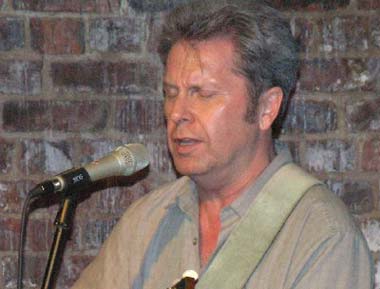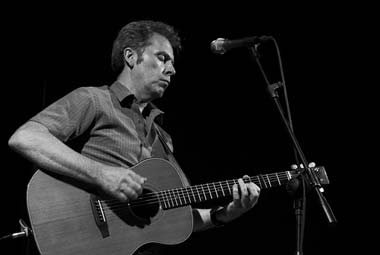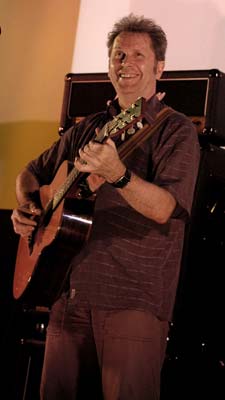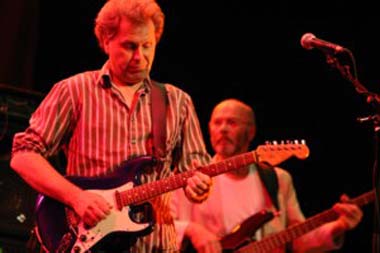Intervista a Ken Nicol
Initial Variations is the perfect occasion to have an interview with Ken Nicol, passing throught his musical journey.

Chitarrista, cantante e compositore, Ken Nicol è una vera e propria leggenda del folk-rock inglese, avendo recitato un ruolo da protagonista sia con l’Albion Band insieme ad Ashley Hutchings sia più di recente con i riformati Steeleye Span. Nella sua lunga carriera tuttavia ha coltivato sempre diversi progetti come solista, come dimostra il successo dell’ottimo 2 Frets From The Blues di un paio di anni fa. Il suo nuovo album, Initial Variation, è l'occasione per intervistarlo spaziando dal suo percorso artistico, all'album passando per le tante collaborazioni che costellano la sua carriera.
Come hai iniziato a fare musica?
Ho iniziato a suonare la chitarra all'età di 12, dopo aver chiesto con insistenza vari strumenti per Natale o per il compleanno. Come molti bambini di quel età e di quell'epoca, sono stato influenzato fortemente dai Beatles; loro sono stati probabilmente la mia più grande ispirazione. Così mia madre mi ha comprato questa chitarra di plastica con quattro corde, molto simile all'ukulele di qualsiasi altra cosa, ed insieme c'era un piccolo libretto con gli accordi e varie canzoni come Home On The Range. Nel giro di un giorno o due imparai a suonare tutte le canzoni. Mia madre rimase molto colpita e mi comprò un'altra chitarra, questa volta a sei corde. Mia sorella che aveva sei anni di più, quando cominciò ad andare all'università a Londra cominiciò a portare a casa i dischi di Bob Dylan, che è stato il mio vero grande ispiratore.

Il tuo primo album è Easy Street, con Pete Marsh, ci puoi parlare del tuo rapporto con lui?
Pete è mio cognato, egli ha sposato mia sorella minore Gloria nel 1970 o giù di lì. E 'stato nel 1971, quando ha messo insieme la sua banda Gwenyway (fusione di go-any-away) a Londra, non molto tempo dopo mi chiese di entrarci. La band si sciolse circa un anno dopo, e così decidemmo di continuare come duo, e incidemmo il nostro disco come Nicol & Marsh, nel 1974 che uscì per la Epic, etichetta nel giro della CBS. Nel 1975 firmammo con la Polydor ed uscirono altri tre Lp: Easy Street, Under the Glass, and Nicol & Marsh. L'ultimo disco dei tre, fu inciso a Los Angeles, utilizzando i migliori musicisti della West Coast, gente come Bill Payne, Leyland Sklar e Victor Feldman. L'album è fu molto buono, ma non uscimmo nel momento giusto, in quel periodo stava esplodendo il punk nel Regno Unito, e il nostro cantutorato rock fu spinto sempre più in secondo piano. Sembrava impossibile ottenere qualsiasi tipo di airplay, così il disco finì nel dimenticatoio. Una grande vergogna.
Chi ha influenzato maggiormente il tuo stile chitarristico?
All'inizio ero affascinato da molti dei chitarristi folk di quel periodo (a fine anni Sessanta) e dallo stile di fingerpicking comunemente denominato clawhammer. Poi dopo John Renbourn è venuto e Davy Graham, due chitarristi veramente innovativi. Lo stile di Renbourn ebbe un forte impatto su di me come il rag-time playing di Ralph McTell Un altro è stato James Taylor, di cui non si fa mai riferimento alla sua tecnica chitarristica, ma il suo tocco, i tempi e la creatività sulla fretboard sono così belli e naturali. Stranamente, non sono mai stato colpito da tutto ciò che fanno molti dei grandi virtuosi; posso però essere molto impressionato dalla velocità e dallo stile percussivo di alcuni dei più moderni chitarristi, ma il mio interesse non dura a lungo; sono più per la melodia e l'armonia. Per la chitarra elettrica, spiccano per quanto mi riguarda Peter Green, Freddie King e Jeff Beck.
So che da tempo hai stretto un sodalizio con Ashley Huthchings, ce ne puoi parlare?
Il mio lavoro con Ashley ha avuto inizio nel 1995, quando sono entrato la sua Dance Band con cui ho inciso Batter Pudding for John Keats, disco che ho anche prodotto. Poi sono entrato nella Albion Band di cui sono stato membro per quattro anni, e con cui ho inciso quattro dischi, Happy Accident, Before Us Stands Yesterday, Road Movies, and the Christmas album. Sono stato anche nei Morris-On Band. Insieme abbiamo scritto molti brani di cui vado molto orgoglioso e continuiamo a scrivere insieme ancora oggi per il nostro prossimo disco che dovrebbe essere finito per la metà del 2008.

So che il suono ha americano influenzato il tuo stile musicale. Ci puoi dire quanto la West coast ha influenzato il tuo background di brit-folk?
Questa è una domanda interessante. Non sono mai stato consapevole di appartenere ad una categoria musicale, in effetti io dirò sempre di essere ignaro di questo. Nei primissimi tempi si poteva tranquillamente dire che essendo il mio stile acustico ero un musicista folk. Posso però dire che: in quel momento ascoltavo molto blues, in quell'altro ero interessato a Larry Carlton e agli Steely Dan. Ho preso tutti questi elementi e li ho fatti miei. Naturalmente lavoro con molte persone che si identificano fortemente con un particolare genere di musica o un altro e, di conseguenza, ho di conseguenza avuto problemi a suonare quando il mio è stato percepito come forse troppo bluesy, diciamo, per una canzone folk inglese. Ma questo è il punto interessante per me, perché spesso, lungi dal che sia uno scontro di stili, può essere molto efficace più che la fusione con la ruvidità della canzone folk inglese, la scelta di mescolare in essa diversi stili come il blues, il jazz o qualsiasi altro. Il solo conflitto è nella mente di coloro che scelgono di vedere nella propria vita niente di diverso dal bianco o dal nero.
Perché hai deciso di entrare nella Albion Band?
In quel momento l'ho vista come un'opportunità per sviluppare la mia collaborazione a livello di scrittura con Ashley e per far ascoltare la mia musica da un pubblico più vasto.
Parlando di songwriting. Quali sono le tue principali ispirazioni?
Credo che l'arte del songwriting si è perso negli ultimi anni; così che la musica di oggi è diventata troppo incentrata sul ritmo, con melodia, armonia e testi che sono molto meno prioritari. Le miei ispirazioni sono quelle dei giorni di "Tin Pan Alley", giorni in cui il ritmo, la melodia, l'armonia e il sentimento erano artigianalmente in quilibrio. Sto parlando di nomi come Irving Berlin, Hoagy Carmichael e George Gershwin. I Beatles facevano musica allo stesso modo, ma da allora il songwriting è diventato sistematicamente più cieco verso queste cose.
Mi piace moltissimo il tuo album Thirteen Reasons. Puoi parlarcene?
Volevo che Thirteen Reasons rappresentasse il mio punto di vista e il mio approccio alla musica; bene, qualsiasi album dovrebbe rappresentare l'artista l'approccio alla musica, ma questa volta ho dovuto realizzare una più ampia gamma di stile e di colore per me. E' necessario per comprendere le canzoni che vengono cuore, canzoni che vengono dalla testa, strumentali, tristezza, umorismo, chitarra acustica, chitarra elettrica, banjo, ukulele, ecc Suppongo che rappresenti un artista che facilmente si stanca di fare per troppo tempo la stessa cosa .
Nel 1980 hai registrato un disco con Al Stewart, ce ne parli?
L'album si chiama 24 Carrots. Al registrò quel disco nello stesso periodo in cui mi sono trasferito a Los Angeles. Cantai alcuni backing vocals ma successivamente ho lavorato come chitarrista solista nella sua backing band: Shot in the Dark.
Adesso sei nella line up degli Steeleye Span ... ci parli di questa scelta?
Non molto tempo dopo aver lasciato la Albion Band mi iscrissi ad un corso di laurea in Musica Contemporanea presso la University of Central Lancashire, qui nella mia città natale di Preston. Ho seguito circa due mesi di corso, quando il bassista degli Steeleye Rick Kemp ha assistito ad un mio concerto alla Penrith Guitar Show a Cumbria. Gli Steeleye avevano appena registrato Presence il disco che ha segnato il loro trentacinquesimo anniversario. Bob Johnson, chitarrista da lungo tempo nella band ha deciso di non fare tour, così mi è stato chiesto se ero interessato a sostiuirlo. Ho preso l'occasione al volo; gli Steeleye sono una band molto singolare con un pizzico di stile folk-rock. Sono sei anni che sono in tour con loro, come del resto attualmente.
Hai preso parte a due compilation The Magic Of Morris and Midwinter ce ne parli?
Sono stato coinvolto in tre disco Morris-On: il nipote di Morris-On, bis-nipote di Morris-On, e la Madre di tutti i Morris-On. Le compilation sono cose che comunque non seguo molto se ne occupano le case discografiche.

Vorrei parlare adesso di Initial Variations, come nasce questo disco?
Io non avevo mai fino a poco tempo preso in esame l'idea di fare un disco strumentale, anche se la gente me lo aveva suggerito, e poi mi sono accorto che era venuto il momento. Le canzoni cantate sono uno standard largamente accettato di questi tempi, sono un mezzo per comunicare sentimenti e storie che non lasciano molto lavoro da fare per la fantasia, ma solo la musica può essere aperta a più ampie interpretazioni, e lascia molto di più all'immaginazione. L'idea che sta dietro ad Intial Variations, è stato il mio amore per Enigma Variations di Edward Elgars. Ho deciso che avrei fatto dei brani su alcune persone che sono nella mia vita, una sorta di dedica collettiva, a ciascuna inziale corrisponde una parsona, sia essa un familiare o un amico, presente o passato.
In Initial Variations suoni molti strumenti, come da uno strumento può nascere una canzone?
Immagina che sia un po' come la cottura; lo strumento è l'ingrediente di base e devi cospargere le tue idee su di esso. Metti sul fuoco per massimo quaranta minuti e poi "hey presto!" ecco qualcosa che ho preparato già in precedenza. In realtà, lo strumento può essere utilizzato in modo completamente arbitrario e deliberato.
Hai collaborato anche con Ernesto De Pascale in Morning Manic Music ... cosa pensi di questo meraviglioso album?
Si tratta di un esempio perfetto della mia prima descrizione, l'album deve esprimere la vera natura dell'artista. Morning Manic Music rappresenta perfettamente il vero carattere individuale, la forza, l'immaginazione, l'innovazione e artistica, e più di tutto il cuore di Ernesto.
Salvatore Esposito
Inteview with Ken Nicol - English version
How did you start off making music?
I began playing guitar at the age of 12, it was after I’d been asking insistently for various instruments every Christmas or birthday. Like many kids of that age and that era, I was heavily into the Beatles; they were probably my biggest inspiration then. So my Mother bought me this plastic thing with four strings (more like a ukulele than anything else), along with it came a small booklet with a few chord shapes and songs in it - like ‘Home on the Range’. Within a day or two I was playing all the songs. My Mother was so impressed she bought me another guitar, this time with six strings. My sister who was six years older and going to university in London started bringing home these Bob Dylan albums, and that was it, I was well and truly inspired.
Your first album is Easy Street with Pete Marsh, may you talk about your friendship with him?
Pete was actually my Brother-in-law, he’d married my younger sister Gloria in 1970 or thereabouts. It was 1971 when he took his band Gwenyway (a composite of: go-any-way) to London, and not long after that he asked me to join. The band split after about a year, and we decided to continue as a duo,landing our first album deal with CBS records in 1974, and releasing our Nicol & Marsh’s Easy Street album on CBS’s sister label Epic. Signing with Polydor in 1975 we went on to release three more LPs: Easy Street, Under the Glass, and Nicol & Marsh. The final one of those three albums was recorded in Los Angeles and we used some of the top west coast players - people like Bill Payne, Leyland Sklar & Victor Feldman. The album was very very good, but our timing was terrible; this was the beginning of the punk explosion in the UK, and the kind of ‘song oriented’ melodic rock we produced got pushed more and more into the background. It seemed impossible to get any kind of airplay, so the record disappeared into oblivion - a great shame.
May you talk about your principal influence in your guitar style?
Originally I was fascinated by many of the popular folk guitarists of that time (mid to late sixties) and the style of fingerpicking commonly referred to as the clawhammer. Then along came John Renbourn and Davy Graham, two truly innovative guitarists. Renbourn’s style made a big impact on me as did Ralph McTell’s rag-time playing. Another was James Taylor; very little reference ever seems to be made to his guitar technique, but his touch, timing and creativity on the fretboard are so beautiful and natural. Strangely, I’ve never been all that moved by many of the great virtuosos; I can be very impressed with the speed and percussive style of some of the more modern players, but my interest doesn’t last for long; it’s more about melody and harmony for me. On the electric guitar front the names that stand out for me are Peter Green, Freddie King and Jeff Beck.
I know that you have a long time relationship with Ashley Huthchings. May you talk about?
My work with Ashley began in 1995 when I joined his ‘dance band’ as it was called. We recorded the ‘A Batter Pudding for John Keats’ CD which I produced. Then I joined the Albion Band in which I was a member for about four years. The four CDs I recorded with the Albions were: Happy Accident, Before Us Stands Yesterday, Road Movies, and the Christmas album. I’ve also been a member of his ‘Morris-On’ band. We’ve co-written a lot of songs that I’m very proud of, and we continue to write together today - presently for our own recording project which should be finished by mid 2008.
I know that the American sound influenced your music style. Would you say that you were picking up US West Coast influences onto your brit-folky background?
This is an interesting question. I’ve never been all that conscious of musical categories, in fact I’d go as far as to say that I have been oblivious to them. In the very early days though you could certainly make the argument that my style was very much ‘acoustic’ and therefore ‘folk’. I can point towards certain times in my life, and say - ‘at this time I listened to blues a lot’, ‘at that time I was interested in Larry Carlton and Steely Dan’, etc. I’ve taken elements from all of these styles, and hopefully I’ve made them my own. Of course I work with many people that strongly identify themselves with one particular genre of music or another, and consequently I’ve run into problems on occasion when my playing has been perceived as maybe too bluesy, lets say, for an English folk song. But this is where it becomes interesting for me, because often, far from it being a clash of styles, it can be very effective fusing the more rustic nature of an English folk song and all it’s rough edges with the smoother, more precise character of a different style - be it blues, jazz or whatever; the only conflict is in the mind of those who choose to view life in nothing other than black and white.
Why did you decide to join the Albion Band?
At the time I saw it as an opportunity to develop my writing partnership with Ashley, and to have my playing heard by more people.
Talking about songwriting. What are your ispirations?
I feel that the art of songwriting has been lost in recent years; so much of today’s music has become far too focused on rhythm, with melody, harmony and lyrics given much less priority. My inspirations would all be from those ‘Tin Pan Alley’ days’, the days when rhythm, melody, harmony and sentiment were crafted in a balanced way; I’m talking about names like: Irving Berlin, Hoagy Carmichael and George Gershwin to name but three. The Beatles crafted their music in a similar way, but since then, songwriting, like so many other things in life, has been systematically dumbed down.
I love too much your album Thirteen Reasons, may you talk about it?
I wanted Thirteen Reasons to represent my view and approach to music; well, I guess any album would need to represent the artist’s approach to music, but this one had to achieve a wider range of style and colour for me. It needed to encompass songs from the heart, songs from the head, instrumentals, sadness, humour, acoustic guitar, electric guitar, banjo, ukulele, etc. I suppose it represents an artist who gets easily tired of doing too much of the same thing.
In 1980 you recorded an album with Al Stewart, what about?
The album was called 24 Carrots. Al recorded this at about the same time as I moved to Los Angeles. I just sang a few backing vocals on the record. I also worked as lead guitarist with his backing band: Shot in the Dark.
Now you are also in Steeleye Span line up... May you talk about this choice?
Not long after leaving the Albion Band I enrolled on a ‘Contemporary Music’ degree course at the University of Central Lancashire here in my home town of Preston. I was about two months into the course when Steeleye bassist Rick Kemp saw me perform at the Penrith Guitar Show in Cumbria. Steeleye had just recorded their ‘Present’ album which marked their 35th anniversary. Bob Johnson, the bands long time guitarist decided not to do the up-coming tour, so I was asked if I was interested. I jumped at the chance; Steeleye are a very unique band with a very unique style of folk-rock. Six years on I’m still touring with them, presently on the 2008 Spring UK tour.
You take a part in two compilation The Magic Of Morris and Midwinter, may you talk about?
I’ve been involved in three Morris-On albums: Grandson of Morris-On, Great Grandson of Morris-On, and Mother of all Morris-On. The compilation albums are something I know very little about; this is the kind of things record companies just do.
Now I wanna talk about your last album, Initial Variation... May you talk about how was born the idea for this album?
I’d never until very recently spent much time contemplating the more selective approach of a purely instrumental album. Often though people had suggested to me that I make an instrumental album, and I figured that time had come. Songs and vocal oriented music is by and large an accepted standard in our time, a means of communicating sentiment and story that doesn’t leave much work for the imagination to do, but music alone can be far more open to wider interpretation, and leaves more to the imagination. The concept of the theme behind Initial Variations was a result of my love for Edward Elgars: Enigma Variations. I decided that I also would base all the pieces on some of the people in my life; a collective dedication - each title being the initials of an individual, be it family or friend, past or present.
In Initial Variation you play a lot of instrument, how can an instrument make a song?
I guess it a little like cooking; the instrument is the basic ingredient - then you sprinkle all your ideas over it. Gas mark six for fourty minutes, and - ‘hey presto’ - here’s something I prepared earlier. In actual fact, the instrument used can be both completely arbitrary, and very deliberate.
You collaborated also with Ernesto De Pascale's Morning Manic Music... what do you think about this wonderful album?
It is a perfect example of my earlier description, that of the album expressing the true nature of the artist. Morning Manic Music perfectly represents the truly individual character, the force, the imagination, the innovation and artistry, and most of all - the heart of Ernesto.
Salvatore Esposito